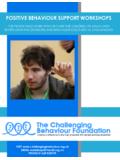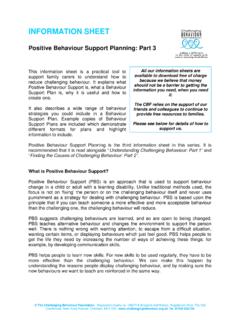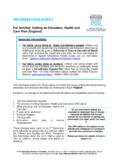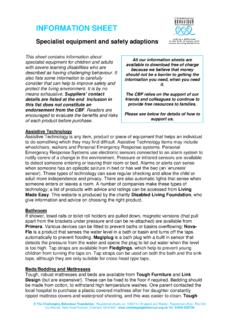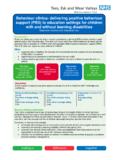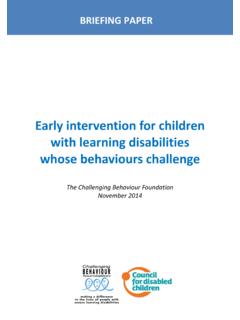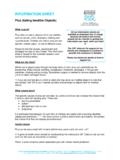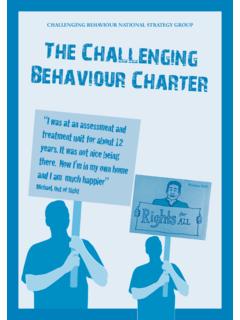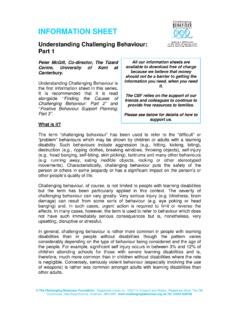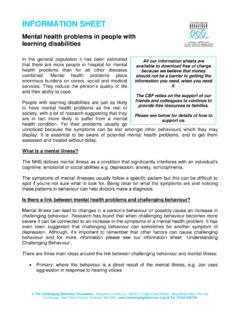Transcription of INFORMATION SHEET - Challenging Behaviour
1 The Challenging Behaviour Foundation. Registered charity no. 1060714 (England and Wales). Registered office: The Old Courthouse, New Road Avenue, Chatham, ME4 6BE. 01634 838739 INFORMATION SHEET Challenging Behaviour Supporting Change Using a functional assessment to understand Challenging Behaviour and identify ways of supporting Behaviour change Mark Addison, Counselling Psychologist, Community Learning Disability Team, Somerset Partnership NHS and Social Care Trust.
2 When a child s Behaviour has been identified as Challenging , it is essential that a rationale is first provided as to exactly why it is Challenging . Indeed, a problem for one person is not always a problem for another person. Sometimes the question must be asked, Whose problem is it? This is not to suggest that a difference of opinion should be ignored. Indeed, the fact that one person believes a Behaviour to be a bigger problem than someone else, may simply reflect a limited knowledge about child development, or unrealistic expectations about how the child should behave.
3 In this respect, some INFORMATION and/or supportive counselling may be helpful. It is also important to consider the degree of intent that may lie behind the Behaviour . Challenging Behaviour in people with severe learning disabilities is not necessarily deliberate or planned. Rather, in situations of need, people with severe learning disabilities may simply behave automatically in ways which have been successful in the past. When trying to understand the reason(s) for a child s Challenging Behaviour , a medical investigation should be sought in the first instance, to check for any possible underlying health influences.
4 Common conditions such as ear infections, tooth-ache, constipation, urinary tract infections or epilepsy may all cause, or contribute to someone s Challenging Behaviour . Functional Assessment A functional assessment of the Behaviour may provide some answers, or at least some theories, about the causes of an individual s Behaviour . As noted in the Challenging Behaviour Foundation s Basic INFORMATION about Challenging Behaviour INFORMATION SHEET , a functional assessment (sometimes referred to as a functional analysis) aims to shed light on the particular needs which a person gets met through their Behaviour .
5 "It is not a matter of what causes self-injury or what causes aggression or what causes stereotyped or repetitive movements but for each of these difficult forms of difficult Behaviour , what does it do for the individual, what purpose does it serve for them in their life?" E. Emerson (quote from Brown and Brown, 1994) By conducting a functional assessment, you are learning about people before you intervene in their lives. Hence, rather than basing interventions simply on hunches , trial and error , or what seemed to work for someone else , the functional assessment process should guide the 2 The Challenging Behaviour Foundation.
6 Registered charity no. 1060714 (England and Wales). Registered office: The Old Courthouse, New Road Avenue, Chatham, ME4 6BE. 01634 838739 development of a more objective and individually tailored support plan. A functional assessment is typically carried out by a psychologist or other Behaviour specialist in collaboration with parents or primary carers. As a parent, or primary carer, you are most likely to experience one of the following two approaches to functional assessment, or perhaps (and preferably!)
7 Both in combination 1. The Indirect Approach: The indirect approach is so called simply because the methods are not based on the direct observation of the Behaviour by the person who is carrying out the assessment. Instead, the assessment is based on the results of questionnaires, interviews, rating scales, or daily recording charts that have been completed by parents or primary carers. The Descriptive Approach: In contrast to the indirect approach, the descriptive approach involves the direct observation of the Behaviour , by the person who is doing the assessment, as it occurs in the natural setting, , using a recording chart to record observations of the Behaviour in the home, the school, or the supermarket.
8 What Purpose (or Function) Does Challenging Behaviour Serve for People? Although there are many reasons why a person may present with Challenging Behaviour , researchers and clinicians have found it helpful to consider function in relation to the following four categories: 1. Social Attention: We have all heard the saying, It s just attention seeking Behaviour . It is not bad to want attention from others. Unfortunately, for a variety of reasons , limited communication skills, boredom, poor self-occupation skills, some people may learn that behaving in a particular way is a reliable way of attracting others attention, even if it is negative.
9 For example, a child may find adult one-to-one interaction very rewarding, but at school has to share their teacher or assistant s time with the rest of the class. This child may learn that wetting their clothes is associated with an adult providing them with one-to-one attention in the form of helping them to clean up and change into dry clothes. 2. Tangibles: Here it is the desire for certain things , food, drink, objects or activities, which is providing the motivation for the Behaviour . Again, it is not bad to want these things.
10 If you are thirsty, it makes sense to try and get something to drink. If you want a bath, it makes sense to try and get someone to bathe you. However, problems arise when an individual learns to act inappropriately to get these things. 3. Escape: Whilst some people crave attention, for some people being left alone is the ideal situation. Rather then behave in a particular way to get people s attention, these people will behave in a particular way to avoid situations or activities that they do not like, or do not find particularly rewarding.
